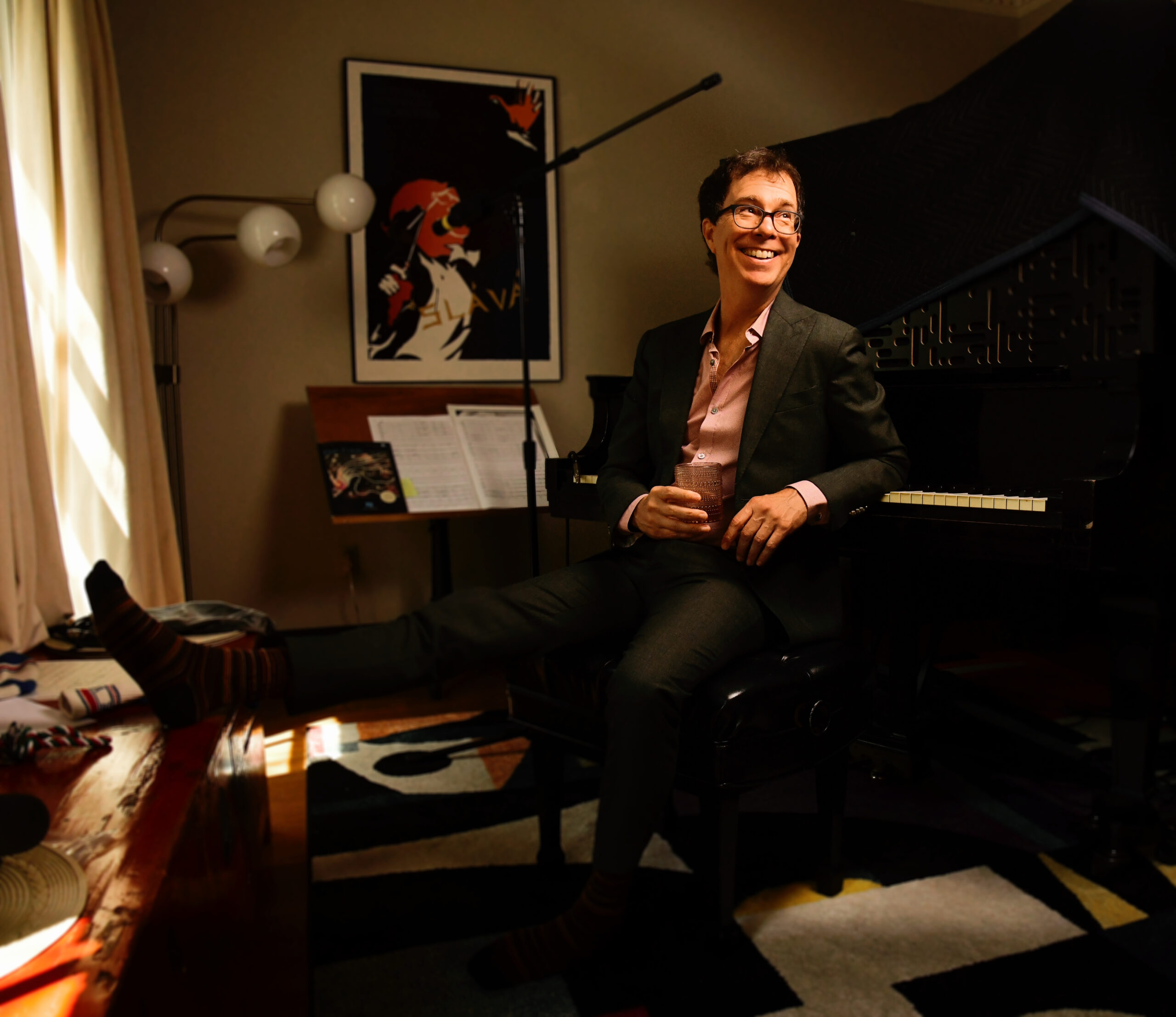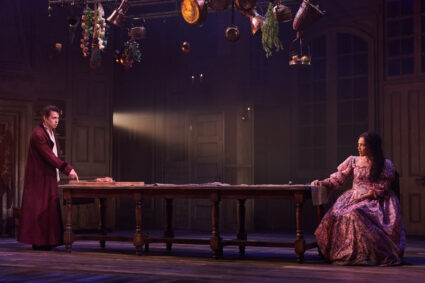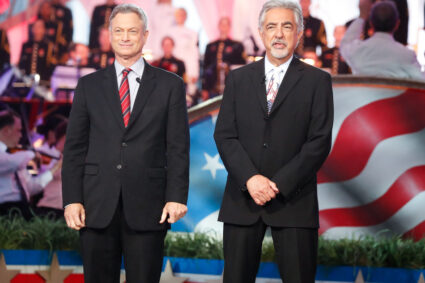
On this Fall edition of SNAPSHOTS!, we’re about to talk to a wonderful, wonderful, talented musician, especially since he has had a great connection with the DC metro area. Since May of 2017 he has been the first artistic advisor to the National Symphony Orchestra here at the Kennedy Center in Washington, DC, and in just a few short days, he is going to be performing for not one, but two concerts called “Recording Live with the NSO at the Kennedy Center Concert Hall this Friday & Saturday, October 25-26th. He has a brand-new album Sleigher that’s coming out this Friday!
Ladies and gentlemen, what a wonderful musician. Let’s welcome Ben Folds!
With the holidays, we’re all all of us have something to look forward to with the holidays being closed, but you have a brand-new album that’s coming up on the 25th, the same day you’re going to have the first of your two concerts. It’s a holiday collection called Sleigher, which I listened to over the weekend, and it is amazing. I feel like this is the first true holiday album of the year, which has seven original numbers and three covers. So, tell the audience, how did this album come to be and what can it go forward to within the next few days?
Well, first, I thought it was going to do more covers and the original songs, the cover ratio, they had to take over as I got more interested in the idea of Christmas being like a yearly run. I’ve always I’ve always liked this idea, because when you get to the end of the year, it punctuates suddenly whether you even care about Christmas. It totally is punctuated by something familiar sounding the same way as a run works at the end of the line. And what that allows you to do is to weed out all that is new.
If you’re sitting at Christmas dinner, everything seems the same. The songs are always the same, the colors the same, weather is the same. Everyone’s gathered around, but you realize, the nephews have now grown up, or there’s someone who’s not with you anymore, or someone who’s wasn’t there before. And then further, you start to think about how you’re different than last year. You know how we’re different every year is much more easily accessible to us by way of comparing it to something, by saying what’s the same?
And you have done it justice with this brand-new album Sleigher. And you chose three covers for the songs you mentioned about covers moments ago, which The Christmas Song is a classic. You did it so well, especially with the harmonica part during the chorus, and you then you brought another song with Burt Bacharach and Herb Alpert in mind. What made you choose those three songs to include in your album?
This is going to sound cocky, but I was just having a tough time finding songs that were holiday songs that I thought were as good as something I could write. Burt Bacharach’s partially obscure song, The Bell that Couldn’t Jingle that Herb Albert did. It’s not all that well known, but as you’d imagine, it’s an excellently written song. It’s just really charming. It’s classic Bacharach. It also implies a mythology behind this bell, and not being able to share its feelings. I thought that was just neat.
The Christmas Song is hard to avoid. I’ve always thought that was one of the most harmonically interesting Christmas compositions, and so we recorded it. It was the middle of the summer, as it would do when you’re making a Christmas album. It was storming outside and just rain hitting the roof of this room. We just recorded it in one pass. You know, no bass, just a piano and a classical guitar. The pianist doubled on the harmonica, because he’s a great piano & harmonica player, and I just stood and sang. You can hear the rain start, and then in the take of the song. And I think it’s special.
The other cover is a classic old Mills Brothers song, and it’s very timely, because it’s about the time of giving, – being Santa and giving presents. But then it goes, “why don’t you just do that the whole year round?” Like, you know, grow a fellow alone. There’s a lot of people in need. Why can’t we do this all year round? It’s a depression era song, very progressive in his thinking. And then, “why don’t we help each other out?” And I think in this era when some people were not helping others out as a badge, and they seem to want to pray the same God that Christmas would imply, so I’m just thought it was an interesting, subtle way to remind them, “yeah, this is nice. Get presents on Christmas, but what would Jesus do?”
And I love that. I’m glad that you picked those three as your covers, but I loved one of your original compositions. We Could Have This with the duet of Lindsay Kraft. It feels like the Christmas song of 2024. I want you to talk about composing this piece and having Lindsay performing a duet with you.
Lindsay is a is an actor, as you said, and that’s what she’s known for, but she she’s written a one-woman musical that is a gorgeous piece. So, I have her opening for me on tour. There’s a lot of a lot of sniffling at the end of her piece every night. It’s about 35 minutes long, the British version of it. She’s never written songs before embarking on that.
We were on tour, and I took the opportunity to just sit with her and improvise some for a song on the on the record. So that’s the result of a little improvisation and then knocking it together. And we just put two mics up and did it. I would say, as an afterthought, but it’s, it’s become the sleeper song of the record, because it was just like, “hey, why don’t we just do this?” So, you know, that’s so special for me too.
Well, it’s special in my heart, I tell you. Now, will Lindsay be performing with you in the two shows that are coming up this bright, this Friday and Saturday?
Of course!
Well, you mentioned, um, in an interview earlier that Sleigher ended up being very much your record in the most classic and reflective sense. Why is that?
Well, it goes back to what I was saying to begin with, I’ve always thought one of the most powerful ways to write, where am I now? Because that’s a moving card. As a writer, you don’t want to think you’ve written it all out. You don’t have to have had anything happen to you. It’s just the expression of writing is about, where am I now? for me. Where I am now is easy to answer on Christmas, because you get past all the distractions quickly. Of course, “I’m home. It’s Christmas. There’s family,” all this kind of stuff. This feels different. Who am I now, you know?
And that’s what the record became about, like this song called Me and Maurice. I’ve always loved the mundane, and writing songs that which is so like unlikely to write a song like this is me walking my dog, Maurice, through the through the snow during Christmas. And it’s reflections on that. And it’s a lively song for considering is a song about walking a dog.
There’s another one about being drunk, not drunk, but, appropriately tipsy at a family get together, and you’re just observing everyone and where they are. And it’s a little rambunctious, little crazy, because sometimes some of our families are just like, not who we would choose. They’re not but, the point of it is to make sure we do this every year, because it’s the only way to touch base with our roots, where we came from.
There’s another one that I just made a classic loop beat, like I just made this, like computer dance music. And it’s, I just went to AI, and I just said, you know, “make me some ridiculous props” and I took it word for word and made a beat. The reason I did that was I was like; this is this sweltering part of the summer with cicadas outside. Why don’t I just report where I am at this moment and just make a beat? My harmonica guy that you heard on the other song, Ross, was sitting around. So, we just bashed this out. And it’s a lot of fun. I normally wouldn’t make a song like that, but I do enjoy dance music.
It feels like a song. Every song in this album is related to everyone. And I got to ask, does Maurice love playing in the snow?
Oh, yes, the song choruses, “we’re digging a hole.” And of course, that’s got all kinds of metaphors that can be built into it. But when he gets back home, he’d love to dig through the snow after our walk, and then I bring it back in and towel off. But we do live next to a freeway, and that freeway does run, I-40 all the way out to California and just the idea that he’s digging a hole, and goodness knows where the highway goes. I just, I enjoyed the Bruce Springsteen humble.
I felt that with by listening to the album. Now, since May of 2017, you’ve been the first artistic advisor to the National Symphony Orchestra at our beloved Kennedy Center. What is special about performing at the Kennedy Center repeatedly? Because every time I go to an NSO concert, I am never disappointed. It’s always this happy go-lucky feeling.
Yeah, it is a great orchestra. My dream for that orchestra has been to make sure that it leads, because we have amazing symphony orchestras out there in the US. It’s intense how many great orchestras we have, and I’ve played with them all. I have wanted to help the National Symphony move into the future, like orchestras always must do. This is nothing new.
Orchestras always had to move into the future and pass the baton to another generation. The temptation is to dumb things down as popular music gets more harmonically simplistic, right? I do not believe in doing that. I’m a fierce advocate for the musician on stage in a symphony orchestra and creating programming that brings people to. A new audience to the orchestra, but also make sure that the orchestra is doing challenging work at the same time, because they don’t want to pause their artistic work to do a kind of dumb down program. And often, this is the approach.
So it’s been a very detail oriented probably eight years now, with the with the National Symphony, and it’s one step at a time, they have resources sometimes that other symphonies don’t, because we can go out and get a funding for things and make sure we have experimental time with orchestrators and rehearsal time things that really dignified, simply orchestra now, when we get these right, then we can pass these, these little clues, and hence the blueprints, on to the to the rest of the country.
My hope is all the orchestras that tour with regularly began to get more intelligent, more challenging, but also just more exciting for an audience material. So, briefly, it is hard trying to get exciting programming into the future where people show up and go, “Whoa, that just blew my brain,” and it was also an experience that the orchestra didn’t need to roll their eyes.
And I can vouch for the numerous programs I have covered and attended over the last few years with NSO, I have never been disappointed. Every time they not only delivered, but they also killed it. I really thank you for your input, and especially you never had to dumb it down because of popular music. It’s so brilliant that kids younger than me should at least attend one of these NSO concerts so it can see the power of these orchestras.
Just the thing it’s like, when you like the symphony orchestra is alive and well, you don’t go to a movie without hearing intense orchestration going on and some of the best orchestras in the world, you know. So, it’s in the mainstream. The problem is usually the kind of programming that brings pop music to a new audience doesn’t get very much rehearsal time, and so the orchestrators are kind of need to get something that they can throw on the stage quickly, and a one size fits all approach is the default.
And there’s a reverse snobbery going on. Pop music is not as simplistic as we think. Pop music is very intense storytelling, and it requires skill of and craft of any performer to translate that just because it doesn’t go through the 12-tone system or something intense musically, doesn’t mean that it doesn’t require a whole lot of nuances in musicality. It’s not a simple fit. Tchaikovsky was a storyteller, Beethoven was a storyteller, Ravel was the storyteller. And now Kendrick Lamar is a classic storyteller. Does that mean we approach it the same way? Probably not. But also, we don’t have to throw out the baby with the bathwater here.
A lot of things work for Beethoven, and they might, they might work for Kendrick, too. And so, I don’t count out any pop. It’s to thumb down pop music is not smart, either. It just requires a lot of time. I put a very full-time effort into this, the National Symphony Orchestra have, in my estimation, over the last 20 years, been taken for granted.
And people need to realize this is a stunning band. Just the individual talent, like you’re saying, I know these people. I’ve heard them play every night. I’ve sat in the middle of that orchestra. I hear beautiful tones coming off their instruments that I could pick out of a lineup blindfolded. They’re gorgeous players. Support them and not just support them, they support civilization.
You just gave a great plug. And speaking of which, what can our Washingtonians expect for these next two shows coming up, this coming weekend?
Well, it’s a rare experience. I mean, certainly it is for me, but it is also for an audience to live records are not the norm, and with a symphony orchestra, a live record is met with endeavor. You can’t just edit and tune and, you know, fix your way through these things. You’re getting what you get. You get a take or two on the next night, and that’s it, and the audience is part of the experience. We are capturing a live event at a very intense time in our history. I take it seriously. It’s like this is right before election time, yes, and a gathering of people listening to the symphony orchestra applauding, being part of a little bit of participation in it is capturing an event that is rare in music. Most of the time we capture an idea. It’s been punched, it’s been edited, it’s been computerized, and those are wonderful things. I love that kind of music too, but this is rare. I’m taking it as a major landmark in my career. And if I were in DC, I would come to see something like that, because it’s rare.
It is. Indeed, you’re right, because it’s been so many years since I heard a live album from an orchestra, and I’m glad that you are taking the time and energy to bring it to DC. I really do appreciate it.
Yes, and when DC has given me that opportunity, and that’s wonderful, it’s exorbitantly expensive to make that kind of album. These are these musicians, as we know they deserve and earn every penny and then some of what they get, their special band.
You’re right. Since we’ve been talking about Christmas throughout the interview, I’d like to know what are some of your holiday traditions that you celebrate?
You know, honestly, I’ve never been a huge holiday person or a birthday person, which is funny that I’ve made a Christmas record, but I am a very sentimental bastard. And you know, when the time comes and you hear Nat King Cole, Bruce Springsteen, Mariah Carey & the Jackson Five holiday covers coming through the speakers. And you’re going to your last-minute dash to the mall to get whatever sale you can. I do feel something, and I try to get together with family when I can miss my traveling. I think it’s cool. I think, no matter what religion you are that time of year is just so familiar.
Ben is going to be performing for two shows at the Kennedy Center Concert Hall with our National Symphony Orchestra this Friday and Saturday. Tickets are available. Go to kennedy-center.org to pick up your tickets. And don’t forget, Sleigher, his new Christmas album, his first Christmas collection of songs, is coming out on October 25 this Friday. Go HERE to order your copy! Pick it up. You do not want to miss it!


